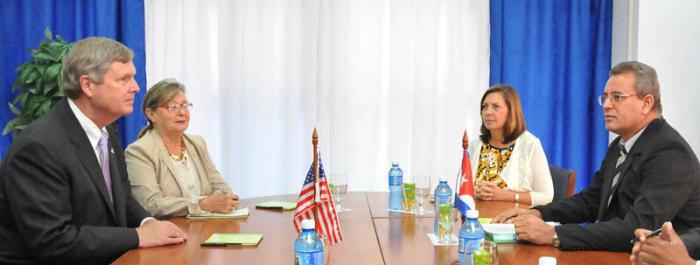
U.S. Secretary of Agriculture, Tom Vilsack, stated today, November 12, in Havana that the United States wants to have “positive” relations with its Cuban counterpart, despite the existence of trade restrictions stemming from the blockade.
Leading the delegation of Congress people and U.S. government officials, Vilsack was received at the Ministry of Agriculture’s headquarters by sector Minister, Gustavo Rodríguez Rollero.
“We very much hope to establish a positive working relationship with Cuba. The potential exists for us to work together cooperatively across a whole series of issues,” stated the U.S. official.
He added that organic farming and Cuba’s experience in biotechnology are of key interest to the U.S.
Likewise Vilsack stated that he hoped to have the opportunity to discuss methods to tackle plagues and common diseases, as well as the impact of climate change.
The visit also served to analyze potential opportunities which will emerge when agricultural products can be freely traded between the two countries, he noted.
Despite the fact that agriculture is one of the first sectors to experience the impact of the thaw in relations, after legislation was modified in 2000; the country’s obligation to pay in advance, in cash, without access to credit, and the impossibility of exporting its products to the North, continue to limit the sector’s development.
Unlike other sectors, where President Obama can use his broad range of executive powers to significantly modify blockade restrictions, it is only Congress that can remove the aforementioned obstacles.
This is why a series of bills are currently making their way through Congress, such as the Cuba Agricultural Exports Act (for the exportation of agricultural products to Cuba), recently submitted by Republican representative from Arkansas, Rick Crawford.
The bill would make credit available to U.S. companies as well as giving them access to Department of Agriculture programs. Likewise it would create a slight opening for U.S. entities to invest in the island’s non-state sector.
In January the country’s main agriculture and livestock companies formed a coalition in order to support such changes and remove obstacles which limit its access to a market located only 90 miles away.
peaking before Congress last December, Vilsack himself reported that Cuba represents a $1.7 billion dollar market, but that Obama’s most recent measures have had little impact in this area.
Cuba has purchased almost $5 billion dollars worth of agricultural products from the U.S. since 2001, given competitive prices and its proximity. However, in 2014, the value of purchases by state entity Alimport fell to almost $291 million dollars, less than half of the highest figure of $710 million reached in 2008.
Thus, the island has turned toward other markets – such as Latin America, Asia and Europe – which offer more favorable financial conditions, despite their greater distance.
Vilsack is the third senior U.S. official to visit Cuba since the reestablishment of diplomatic relations in July this year. U.S. Secretary of State John Kerry arrived in August, while the country’s Trade Secretary, Penny Pritzker, visited in October.
Vilsack is being accompanied by Democratic Senators Jeff Merkley (Oregon); Kurk Schrader (Oregon); and Suzan Delbene (Washington); as well as other representatives from the Department of Agriculture.
His schedule also includes visits to agricultural cooperatives and markets in the capital.











